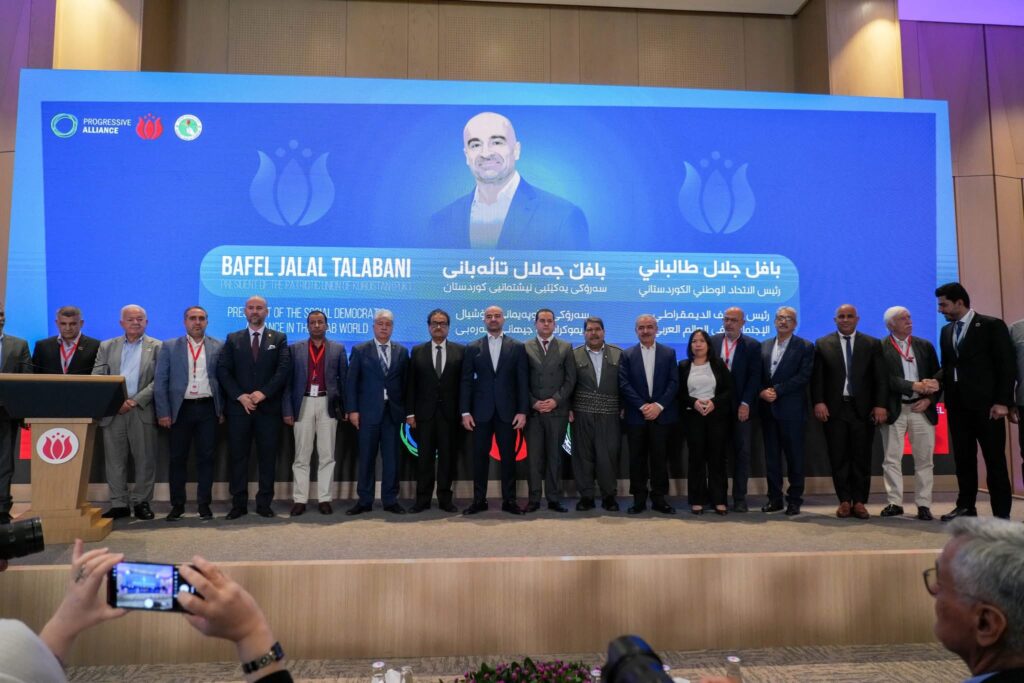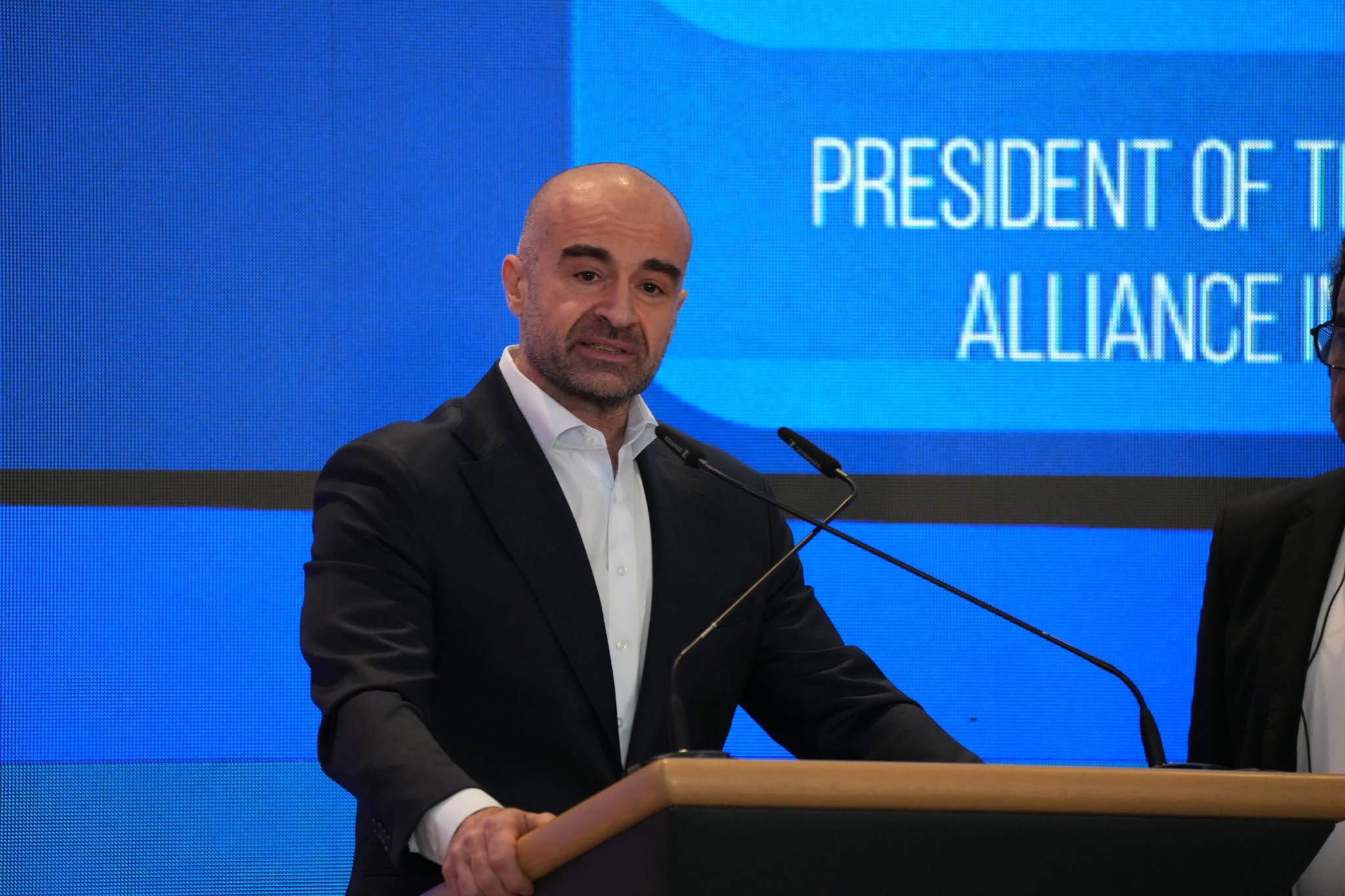Bafel Jalal Talabani of the Patriotic Union of Kurdistan has been elected President of the Social Democratic Alliance in the Arab World during a four-day conference in Sulaymaniyah. The Kurdish leader emphasized transforming the alliance into a “platform for practical cooperation” while expressing hope for the Kurdish people’s future amid regional challenges and global power shifts.
Historic Conference Concludes with New Leadership
The Social Democratic Alliance in the Arab World Conference reached its climax on its fourth and final day in Sulaymaniyah, Iraq, with the election of Bafel Jalal Talabani as the organization’s new president. The announcement came during closing remarks delivered by outgoing president Farid Zahran, who leads Egypt’s Social Democratic Party and expressed confidence that the alliance would be “placed in reliable hands” under Talabani’s leadership.
The conference, which began the previous Wednesday and was sponsored by Channel8, brought together presidents, leaders, and political figures from 21 countries. The gathering served as a crucial platform for strengthening coordination among social democratic parties across the region while deepening ties between progressive Arab and Kurdish movements.
Talabani, who serves as President of the Patriotic Union of Kurdistan (PUK) and holds a position on the Presidium of the Progressive Alliance, addressed participants with gratitude for their “friendship, solidarity, and trust.” His election marks a significant moment for Kurdish representation in regional progressive politics, as he noted, “I hope you saw the hope the Kurds have for the future.”

Sulaymaniyah’s Legacy of Democratic Struggle
In his acceptance speech, Talabani paid tribute to the historical significance of the conference location, describing Sulaymaniyah as a city that “has always been a center of struggle, culture, and determination.” He drew connections between the conference and the city’s democratic heritage, referencing the late Jalal Talabani, known affectionately as “Mam Jalal,” who helped establish the Patriotic Union of Kurdistan as a democratic movement.
“It was from here that Mam Jalal and his comrades built the Patriotic Union of Kurdistan as a democratic movement—a movement rooted in sacrifice, discipline, and above all, service to the people,” Talabani explained to the assembled delegates. This historical context provided a powerful backdrop for discussions about democratic values, human rights, and political freedoms that formed the conference’s core agenda.
The choice of Sulaymaniyah as the venue reflects the city’s ongoing role as a hub for progressive political thought and democratic activism in the Kurdistan Region of Iraq. The conference organizers selected the location to honor this legacy while providing a symbolic foundation for the alliance’s future direction.
Regional Challenges Demand Practical Solutions
Talabani’s vision for the alliance centers on transforming it from a forum for discussion into an engine for concrete action. He painted a stark picture of the current regional and global landscape, noting that the area remains “unsettled by conflicts and insecurities, while across the globe competition between powers is reshaping alliances, new wars are testing the international order and international law,” alongside mounting economic pressures and growing inequalities.
These challenges, according to the new president, require the alliance to evolve beyond traditional diplomatic discourse. “Our Alliance cannot be a talking shop. It must be a platform for practical cooperation,” he declared, emphasizing the need for substantive action over rhetoric.
The PUK leader outlined specific areas where the alliance must focus its efforts, calling for “close coordination between our parties on practical programs, developing a shared strategy for youth, empowerment, equality, and economic justice.” This comprehensive approach reflects the complex challenges facing social democratic movements across the Arab world and Kurdistan, from youth unemployment to gender inequality and economic instability.
Talabani stressed accountability and measurable outcomes, stating that the conference’s value “cannot be measured by what is said here, but rather by what we deliver when we return home.” This emphasis on practical results signals a shift toward more action-oriented regional cooperation among progressive parties.
Building a Progressive Future Through Coordination
The conference concluded with the presentation of reports from the Coordination Body of the Social Democratic Alliance in the Arab World and the Global Coordinator of the Progressive Alliance. Parallel workshops focused on developing a joint action plan for 2025-2027, demonstrating the alliance’s commitment to long-term strategic planning.
The final day’s agenda included joint discussions on a regional action plan, reflecting the new leadership’s emphasis on practical cooperation. Darbaz Kosrat Rasool, Head of the PUK Relations Bureau and Board Member of the Progressive Alliance, delivered the conference declaration, formally outlining the alliance’s renewed mission and objectives.
The conference also featured a meeting with the International Coordination of the Progressive Alliance and multiple international partners, aimed at identifying common interests for future cooperation and coordination. This international dimension underscores the alliance’s ambition to connect regional progressive movements with global social democratic networks.
Under Talabani’s leadership, the alliance aims to advance democratic institutions, values, and human rights while promoting political freedoms across member countries. The focus on youth engagement, gender equality, and economic justice reflects contemporary social democratic priorities adapted to the specific challenges facing the Arab world and Kurdistan.
The election of a Kurdish leader to head the regional alliance represents a significant moment for Kurdish political participation in broader Middle Eastern progressive movements, potentially opening new avenues for cooperation and mutual support among democratic forces in the region.


